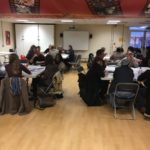On February 3rd, individuals from the local authority, VSCO, education, private and public sector organisations came together to generate ideas on tackling food poverty across Smethwick. Hosted by Smethwick CAN, Real Ideas Organisation and Victoria Park Primary Academy, the event was an opportunity for the community to collaborate and generate ideas which could reduce food poverty in and around Smethwick. Held at Victoria Park Primary Academy, the event was well attended by key stakeholders from the Sandwell borough.
During the event, individuals were tasked with finding enterprising solutions to resolve the challenges which surround food poverty. It is well documented that Smethwick has one of the highest levels of deprivation in England. Uncertain employment, low pay, on-going welfare reform changes and cuts to public spending, mean that people are faced with many challenges. The continued need for Smethwick foodbank services reflects the current situation that many people are facing.
The community engagement event was part of The Connected Schools Programme. A pilot programme working with selected schools across the country exploring the role of schools as catalysts for community businesses in their communities. The programme delivered by the Real Ideas Organisation (RIO), is funded by Power to Change, a new funding body set up to support the growth of community business.
Our school has social enterprise values embedded across its curriculum and already operates Ballot Street Spice, as a school led social enterprise, we are looking to develop our next community venture. Supported by the programme, Ballot Street Spice is in the early stages of setting up a community business called the Ballot Street Bike. A mobile information, advice and guidance service, which will travel around Smethwick, selling its own blend of hot drinks and supporting individuals from the community.
Everyone whom attended the meeting, agreed that there was a definite need for collaboration across the borough and sectors and that a collective approach to working to solve poverty issues is needed. Alongside the Ballot Street Bike, other ideas for community enterprises were generated such as a community café which would offer training and development opportunities for people as well as training to help set up cooperative buying schemes.
The event was successful, with many organisations open to collaborating in future projects and some strong ideas for community businesses put forth for development. Smethwick Can and Smethwick foodbank will be meeting with community partners to discuss further opportunities for collaborative working. The school would like to thank everyone who attended and contributed to the day and are looking forward to what develops next.





